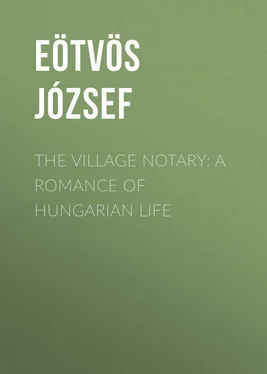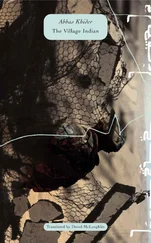József Eötvös - The Village Notary - A Romance of Hungarian Life
Здесь есть возможность читать онлайн «József Eötvös - The Village Notary - A Romance of Hungarian Life» — ознакомительный отрывок электронной книги совершенно бесплатно, а после прочтения отрывка купить полную версию. В некоторых случаях можно слушать аудио, скачать через торрент в формате fb2 и присутствует краткое содержание. Жанр: foreign_antique, foreign_prose, на английском языке. Описание произведения, (предисловие) а так же отзывы посетителей доступны на портале библиотеки ЛибКат.
- Название:The Village Notary: A Romance of Hungarian Life
- Автор:
- Жанр:
- Год:неизвестен
- ISBN:нет данных
- Рейтинг книги:3 / 5. Голосов: 1
-
Избранное:Добавить в избранное
- Отзывы:
-
Ваша оценка:
- 60
- 1
- 2
- 3
- 4
- 5
The Village Notary: A Romance of Hungarian Life: краткое содержание, описание и аннотация
Предлагаем к чтению аннотацию, описание, краткое содержание или предисловие (зависит от того, что написал сам автор книги «The Village Notary: A Romance of Hungarian Life»). Если вы не нашли необходимую информацию о книге — напишите в комментариях, мы постараемся отыскать её.
The Village Notary: A Romance of Hungarian Life — читать онлайн ознакомительный отрывок
Ниже представлен текст книги, разбитый по страницам. Система сохранения места последней прочитанной страницы, позволяет с удобством читать онлайн бесплатно книгу «The Village Notary: A Romance of Hungarian Life», без необходимости каждый раз заново искать на чём Вы остановились. Поставьте закладку, и сможете в любой момент перейти на страницу, на которой закончили чтение.
Интервал:
Закладка:
The warm rays of an October sun fell upon the plains of Tissaret; there was not a cloud in the sky, not a speck of dust on the heath. The solemn silence of the scene was interrupted only by those vague sounds which herald the approach of evening, – the carol of the birds, the faint tinkling of distant sheep-bells, and the song of a lonely workman wending his way homeward, with his scythe on his shoulder. The view from the hill commands the country to the wood of St. Vilmosh, the acacias of Tissaret, and the far windings of the Theiss. On that hill there are two men, whom I take the liberty of introducing to my readers as Mr. Jonas Tengelyi, the notary, and Mr. Balthasar Vandory, the curate of the village of Tissaret.
Every aristocracy has its marks of distinction. Long nails, a tattooed face, a green or black dress, a button on the hat, a ribbon in the button-hole, a sword or a stick with an apple, – these are a few of the marks which in various times and places have served, and still serve, to separate them from the common herd; which, wherever that strange animal – man – has left the savage state and become domesticated, part them asunder from their birth to their dying hour; and which, in the most civilised countries, show you by the very gallows that the culprit is not only a thief, but also a plebeian. Nature, too, has her nobility; she, too, puts marks of distinction on her aristocrat, by which you may know her elect, in spite of all the preachers of a general equality. Nature does not, indeed, compete with civilisation in ennobling a man's fathers that lived before him, or the babe unborn that is to call him father, – but there are cases in which Nature's nobility is unmistakeably expressed in individuals. Any man that has once seen the notary Jonas Tengelyi, will confess that my statement is correct; and to make this fact still more comprehensible, I will add that Tengelyi's nobility dates more than a hundred years back, and that, in the present instance, Nature had all the advantages which the "usus" could give her.
Tengelyi is about fifty years of age, though his thin locks sprinkled with flakes of grey, and the deep wrinkles with which Time has marked his forehead, would cause you to think him older; but then he is like a sturdy oak, with gnarled roots and branches bearing witness to its age, while its leaves are still fresh and green, and show that there is a strong and hearty life in it. Tengelyi's manly form and erect bearing under his silvery locks, and his shining eyes beneath his wrinkled forehead, bespeak him at once as a man whom Time has not broken, but steeled, – and who, like colours that have seen many a battle-field, in the course of years, had lost nothing but his ornaments.
The man who, sitting at Tengelyi's side, counts the petals of a flower, while his eyes are directed to the blue mountain-tops of Tokay looming in the distance, appears still more advanced in age, and his mild and regular features form a striking contrast to the severity which is the leading characteristic of Tengelyi's face. That face exhibits the traces of fiery passions and fierce contentions, which, though soothed into oblivion, might still under circumstances break forth afresh; while Vandory's features might be likened to a clear sky, on which the passing storm has left no trace. Vandory's appearance needs no aid from his clerical dress to inform you that you accost one of those men whom God has sent to represent his mercy upon earth. The notary's bearing shows an honest man, who had but little happiness in the world, – while Vandory is a living demonstration of the old adage, that virtue is its own reward, even in this world of ours.
Vandory at length interrupted the silence which the two friends had observed for the last half-hour, by saying, "Where are your thoughts, my friend?"
"I scarcely know," was Tengelyi's reply. "I thought of my youth, – of Heidelberg, – of my career as a 'jurat.' Do you sometimes think of Heidelberg? I do; and whenever my thoughts return to the green mountains and the bright rivers of that country, I feel inclined to quarrel with fate for casting my lot in this desolate champaign."
"Do not, I pray, abuse our country," said Vandory, smiling. "What can be greener than this meadow? Is not that river beautiful, flowing as it does among the reeds? And what can be more striking than the far steeples and the mountains of Tokay? As for the blue sky and the rays of the setting sun, they are beautiful anywhere. You are very unjust, sir, and that is the long and the short of it."
"And you are the greatest optimist I ever met with," rejoined Tengelyi; "there is not a man on earth but you can talk of his good qualities, and by the hour too. But your taking this country under your protection makes me verily believe that God, for all that he is omnipotent, cannot create anything so bad but that you would hit upon some redeeming point in it."
"Why should I quarrel with His works?" said Vandory. "We ought to be at peace with all men, – and with all countries, too," added he, smiling.
"We ought – but all cannot!"
"We can. Believe me, we are all optimists, every man of us. God made his creatures for happiness; and as Scripture says that heaven and hell are both peopled by the denizens of paradise, so is each joy and each sorrow the result, not of our nature, but of our will."
"But experience!" interposed Tengelyi.
"Experience proves but what we wish it to prove. If you are pleased with the present, you will find pleasant reminiscences in the past, and vice versâ . Go merrily to the glass, and you will see a smiling face in it; and even Echo, lovelorn woman though she be, will speak in joyful notes, if you but address her with accents of joy."
Tengelyi laughed. "There is no disputing with you. I trust when Mr. Catspaw's 'canonisation' comes on, that they will retain you as Heaven's advocate. You will then have a fair chance of showing how many occasions for the exercise of signal virtues that worthy Catspaw gave in his life; for every body who ever refrained from thrashing him, exercised the virtue of self-denial to a remarkable extent. The very hare which the young gentlemen are hunting down yonder ought to be counselled not to appeal to you. You would tell her that to be hunted to death is a hare's happiness and pride. Indeed," added Tengelyi, with great bitterness, "you have undertaken quite as difficult a task in endeavouring to convince your parishioners of what you are pleased to call their happiness, and in pointing out to them for what they ought to be thankful to Providence."
But this taunt was lost upon Vandory, whose whole attention was with the hunt, which then took the direction of the Turk's Hill. "This is savage sport," cried the clergyman at length, "one unworthy of Christian men. I cannot understand how men of education and parts can delight in it!"
"Still it engages your interest," said Tengelyi; and, casting a look at the hunting-party, who were just assembled round the body of the wretched hare, he added, with a sigh, "Alas! these men are happy!"
"As for me," repeated Vandory, "I cannot understand how men of education can delight in that sort of thing."
"I dare say you cannot," rejoined Tengelyi, smiling. "Rarely as we understand the sorrows of others, their joys are a sealed book indeed. But this sport is much the same with other enjoyments which pride or strength procures us. To spy an object out, to hunt it, to gain upon it, and at length to seize it, is indeed a happy feeling – no matter whether the object is a hare or whether it is the conquest of a country. It is always the same sensation; and the difference, if any, is for the spectator, but not for the actor."
"But this is cruel. Consider the sufferings of the poor animal! What an unequal contest! A score of dogs and horsemen after one hare. It is really shocking."
Читать дальшеИнтервал:
Закладка:
Похожие книги на «The Village Notary: A Romance of Hungarian Life»
Представляем Вашему вниманию похожие книги на «The Village Notary: A Romance of Hungarian Life» списком для выбора. Мы отобрали схожую по названию и смыслу литературу в надежде предоставить читателям больше вариантов отыскать новые, интересные, ещё непрочитанные произведения.
Обсуждение, отзывы о книге «The Village Notary: A Romance of Hungarian Life» и просто собственные мнения читателей. Оставьте ваши комментарии, напишите, что Вы думаете о произведении, его смысле или главных героях. Укажите что конкретно понравилось, а что нет, и почему Вы так считаете.












